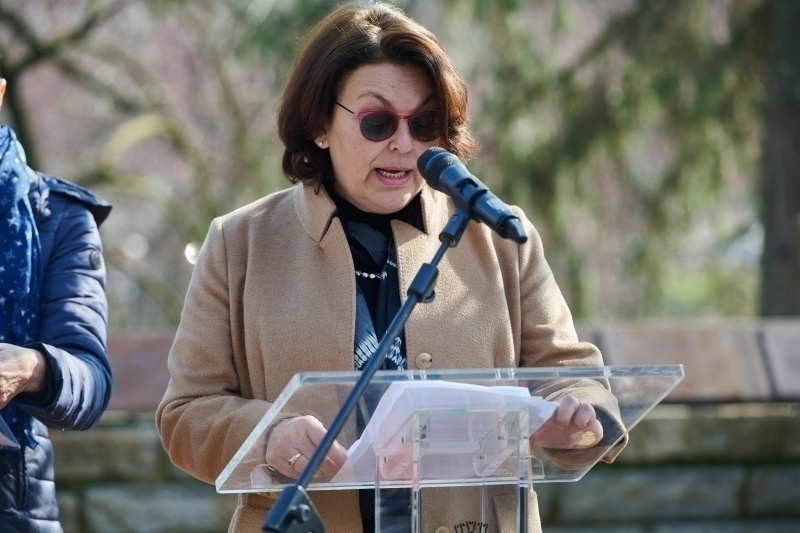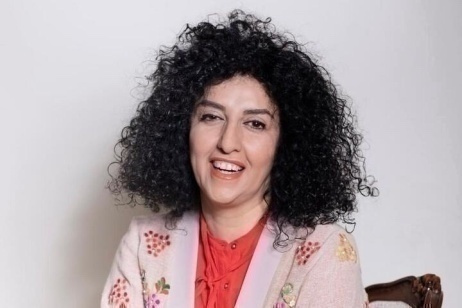The speech by Gabriel Cox, granddaughter of Sir Hersch Lauterpacht, at the 2023 Ceremony at Milan Garden of the Righteous Worldwide.
Thank you for organising this wonderful event today.
I am Hersch Lauterpacht's granddaughter. It is an honour and privilege to be here in your beautiful city, Milan, as a representative of our family. Regrettably, I did not know my grandfather. He sadly died a few years before I was born.
However, as a young child, I was aware of Hersch's importance, as one of the leading international lawyers of the 20th Century, and his enormous contribution to law, international peace and justice. I was also aware of the horrors of the Holocaust, in which Hersch lost almost his entire family. Hersch's wife, my grandmother Rachel, lived close by when I was growing up in Cambridge. She was devoted to Hersch and always talked with love, admiration, and affection about him.
Granny explained that he was a serious man, a loyal friend and that he had a great sense of humour. He was also a phenomenal linguist who spoke many languages, including Italian. He worked to a strict schedule, insisted on meals at regular times and on total silence when he was in his study. He loved classical music, in particular Bach and Beethoven.
Hersch’s story is remarkable, given his humble origins. He was born in 1897 in Żółkiew, a small village in the Austro-Hungarian Empire. His family was Jewish. Education and books were very important to them. Hersch attended the University of Lviv and later continued his legal studies in Vienna. There he met and married Rachel Steinberg in 1923. They soon moved to London and in only a few months Hersch had taught himself English, in part by going to the cinema and listening to the BBC. He entered the London School of Economics as a research student and soon became a lecturer. By 1937 he had been appointed as the Professor of International Law at Cambridge University.
In 1954 he was elected as the British Judge at the International Court of Justice: a remarkable achievement and one that was secured against significant odds. It was during his years in London and Cambridge that Hersch published most of the work for which he has become so widely acclaimed. He was a deep thinker and prolific writer, though I have some sympathy for his loyal secretary who had to decipher his almost illegible hand-writing.
As a non-lawyer myself, I would like to mention two areas of Hersch's work that have touched me deeply, writings that are relevant for a broader audience. There is his remarkable book, An International Bill of the Rights of Man. Written in 1945, it is one of the cornerstones of our modern system of human rights. And, then there is his role in the famous Nuremberg Trials. It was he who introduced the concept of Crimes against Humanity into the Statute and international law, and he wrote large parts of the seminal opening and closing arguments for the British prosecutor, Sir Hartley Shawcross.
It is a source of much happiness to me that in these troubled times, a Convention on the Prevention and Punishment of Crimes Against Humanity is now being negotiated. As a teacher, in London and Cambridge, Hersch taught many future professors, judges, legal practitioners and diplomats. One of his most promising students was his only child, my father, Eli Lauterpacht. Eli in turn inspired generations of pupils, many of whom remain devoted to him. One of them is with me here today, Emanuella Gillard, who was Eli's student, research assistant and is now an active international humanitarian lawyer.
The Lauterpacht spirit – father and son - also lives on through the Lauterpacht Centre for International Law in Cambridge. At this research centre, generations of new students share their interests and passions for the idea of the rule of law in international relations. It is important to remember people who have passed, so I would like to conclude here with a personal reflection: It is my belief, that saying the name of someone who has died, helps to keep them alive in our minds:
For Hersch's parents, Deborah and Aaron, for Hersch's siblings, Sabrina and David, may you, and all the other victims of the Holocaust, rest in peace. For my grandfather, Hersch Lauterpacht, the world remembers you and is grateful for your ideas and your ideals. We remember the legacy of your work for the recognition of human rights for the individual, rights that are now firmly enshrined in law. These laws provide the framework and umbrella that protects each and every one of us here today. Thank you.







